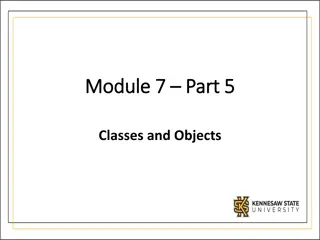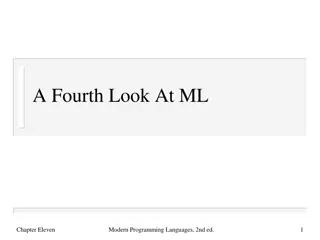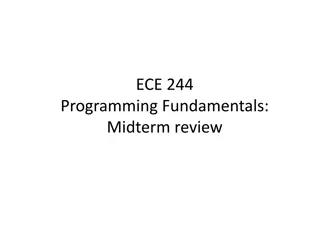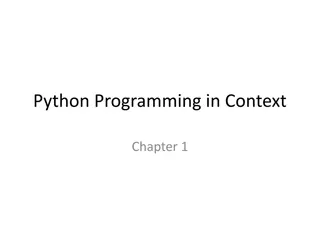Object-Based Programming in Python: Exploring Classes and Constructors
Understanding object-based programming in Python involves creating classes with attributes and methods to build objects. By utilizing class constructors, you can initialize objects with specific values, allowing for unique instances with distinct characteristics. This tutorial covers the fundamentals of creating objects from classes, implementing constructors, and assigning different values to object attributes.
Download Presentation

Please find below an Image/Link to download the presentation.
The content on the website is provided AS IS for your information and personal use only. It may not be sold, licensed, or shared on other websites without obtaining consent from the author.If you encounter any issues during the download, it is possible that the publisher has removed the file from their server.
You are allowed to download the files provided on this website for personal or commercial use, subject to the condition that they are used lawfully. All files are the property of their respective owners.
The content on the website is provided AS IS for your information and personal use only. It may not be sold, licensed, or shared on other websites without obtaining consent from the author.
E N D
Presentation Transcript
15-110: Principles of Computing Object-Based Programming Lecture 25, November 08, 2022 Mohammad Hammoud Carnegie Mellon University in Qatar
Objects Python is an object-oriented programming language An object is a combination of variables (also called attributes or instance variables or object variables) and behaviors (i.e., functions, which are referred to as methods in the object context) To create an object, you need to create a class using the keyword class as follows: class Student: sname = "Mohammad" An attribute; you can have as many attributes as you want
Creating Objects Out of Classes After defining a class, you can create any number of objects out of it s1 = Student() print(s1.sname) s2 = Student () print(s2.sname) s3 = Student () print(s3.sname) But, all of the above students have the same name! How can we have student objects with different names?
Class Constructor All classes in Python have a special function called __init__(), which is always executed when the class is being initiated (i.e., an object out of it is created) You can use the __init__() special function to assign values to object attribute(s) and add any code you may find necessary for creating objects out of your class class Student: def __init__(self, sn): self.sname = sn The __init__() function is called the constructor or the initializer
Class Constructor All classes in Python have a special function called __init__(), which is always executed when the class is being initiated (i.e., an object out of it is created) You can use the __init__() special function to assign values to object attribute(s) and add any code you may find necessary for creating objects out of your class class Student: def __init__(self, sn): self.sname = sn The constuctor should always have the keyword self as its first parameter
Creating Objects Out of Classes You can now create as many students as you like with different names s1 = Student("Khaled") print(s1.sname) s2 = Student("Eman") print(s2.sname) s3 = Student("Omar") print(s3.sname) Is there any other way for assigning different names to different students?
Methods You can assign different values to attributes through methods, which you can define in your class class Student: sname = "" def setSName(self, sn): self.sname = sn Every method in a Python class should have self as its first parameter s1 = Student() s1.setSName("Omar") print(s1.sname)
Methods You can assign different values to attributes through methods, which you can define in your class class Student: sname = "" def setSName(self, sn): self.sname = sn Every instance variable in a Python class should be always prefaced with self upon accessing it s1 = Student() s1.setSName("Omar") print(s1.sname)
Constructor and Methods You can also define __init__() alongside other methods class Student: def __init__(self, sn): self.sname = sn def setSName(self, sn): self.sname = sn def getSName(self): return self.sname s1 = Student("Eman") print(s1.getSName()) s1.setSName("Eman Senior") print(s1.getSName())
Example: Students and Courses Let us write an object-based program for the following two classes Class: Student Class: Course Attributes (or Instance Variables) Attributes (or Instance Variables) sname cname Many students can register for one course sid cid syear slist (a list which holds student objects) Behaviors (or Methods) Behaviors (or Methods) getSName() getCName() getSid() getCid() getSYear() printAllStudents() setSYear(year) addStudent(Student)
Example: Students and Courses class Student: def __init__(self, sn, sid, sy): self.sname = sn self.sid = sid self.syear = sy def getSName(self): return self.sname def getSid(self): return self.sid
Example: Students and Courses def getSYear(self): return self.syear def setSYear(self, sy): if type(sy) is str and (sy.lower() == "freshman" or sy.lower() == "sophomore" or sy.lower() == "junior" or sy.lower() == "senior"): self.syear = sy else: print( Invalid value! Input can be only freshman, sophomore, junior, or senior")
Example: Students and Courses class Course: def __init__(self, cn, cid, sl): self.cname = cn self.cid = cid self.slist = sl def getCName(self): return self.cname def getCid(self): return self.cid
Example: Students and Courses def printAllStudents(self): for i in self.slist: print(i.getSName(), i.getSid(), i.getSYear()) def addStudent(self, st): if type(st) is Student: if st in self.slist: print(st.getSName(), "of id", st.getSid(), "is already registered in the course!") else: self.slist.append(st) else: print("Sorry, the entered argument is not a student!")
Example: Students and Courses c1 = Course("Prinicples of Computing", 15110, []) s1 = Student("Eman", 100, "Freshman") s2 = Student("Omar", 101, "Freshman") s3 = Student("Khaled", 102, "Junior") c1.addStudent(s1) c1.addStudent(s2) c1.addStudent(s3) c1.printAllStudents()
Next Class Complexity























